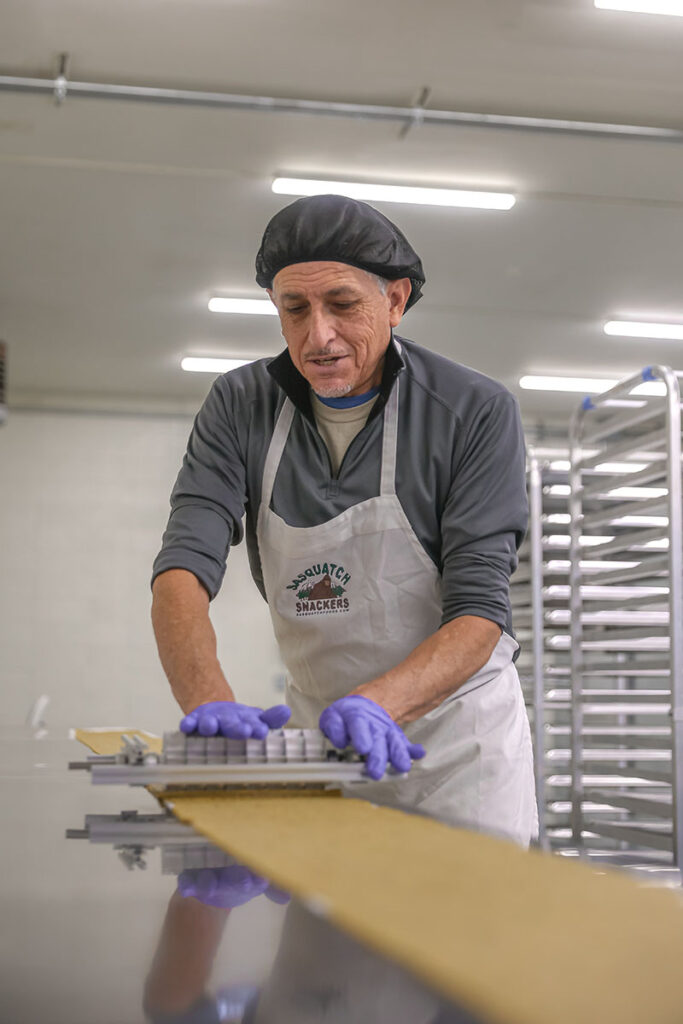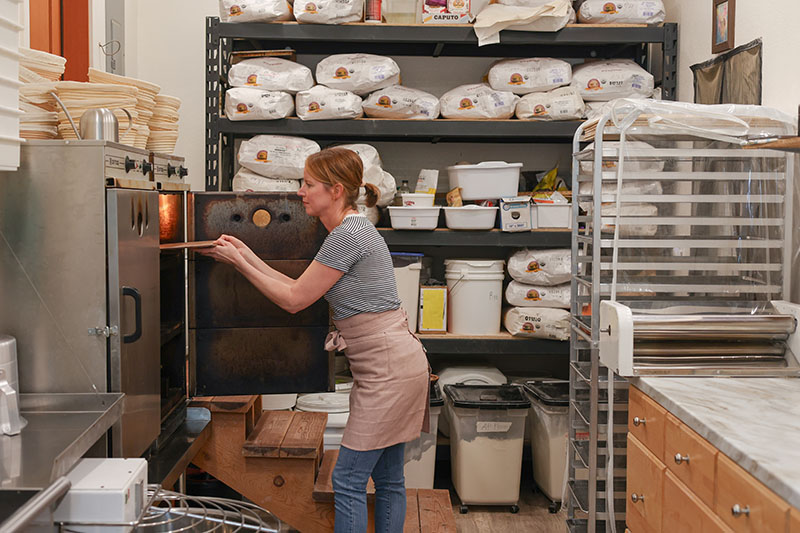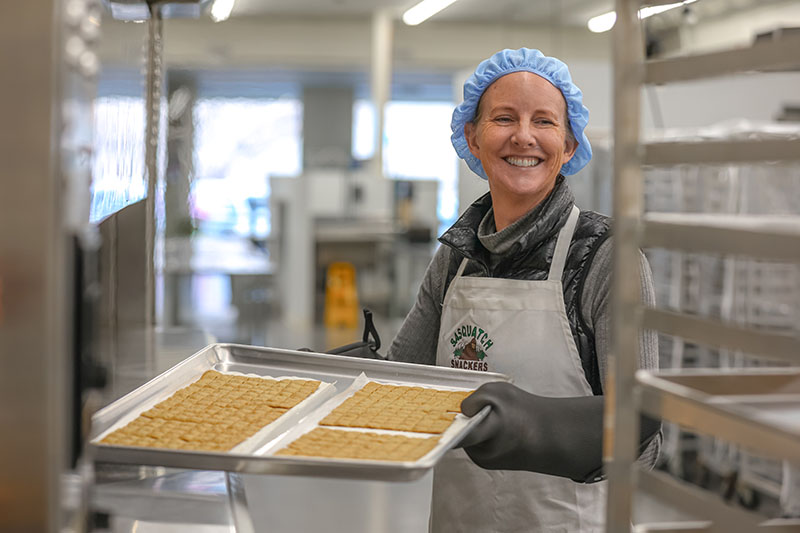Commissary kitchens and cottage food permits help boost food entrepreneurs.
Let’s state the obvious: Starting a business is hard, and there are unique challenges across industries. But when it comes to starting a business in the food sector, finding a financially feasible location that complies with local health department codes is one of the biggest hurdles.
With rising rents across Reno-Tahoe, food entrepreneurs are harnessing the power of community — and ingenuity — to start new businesses or take their existing ones to the next level. Commissary kitchens are cropping up, creating affordable shared spaces and collaboration opportunities, while cottage food permits allow certain food producers to forego commercial rent and work in the comfort of home.
Come Together
“There is such a need for shared commercial kitchens because not many people can afford to have their own place,” says Val Gray, co-owner of Northern Nevada’s Italian Hearts Pasta Sauce. “As we’re seeing more and more, the owners of buildings are raising rents or changing hands, so it’s becoming harder and harder to have your own place.”
Gray started her small-batch sauce company more than a decade ago and learned firsthand how difficult it was to find and outfit a compliant commercial kitchen all while navigating the other challenges of starting a business. Despite living in Reno, she was only able to secure a space in Gardnerville, which she rented out to other local chefs and food-truck operators for many years.
Val finally found a kitchen space in Reno through Nourish & Flourish Kitchen and Market, a new community kitchen and market started by the nonprofit Local Food Network, which she now helps run as kitchen director, along with John and Alicia Chavez, owners of locally produced healthy energy crackers, Sasquatch Snackers. John is operations director of the new commercial kitchen. Located in the 15,000-square-foot space formerly occupied by Bavarian World restaurant and bakery, Nourish & Flourish was established to be a “community-supported incubator space” where chefs and bakers can grow their small businesses.
Membership to the commissary kitchen is $650 a month and provides up to 80 hours a month of booked time in the kitchen, as well as food storage, retail space, and even business support.
“If you had your own place, you’d have to pay for your own utilities and insurance for the whole building. It’s way more expensive,” Val notes. “We’re also working directly with Made in Nevada and the Small Business Development Center for resources to help you structure your company and build everything you need within your business. We’re trying to have as many resources as we can for success.”

Through a partnership with the Nevada Department of Agriculture, qualifying food producers at Nourish & Flourish can get their products in Nevada food banks through the Home Feeds Nevada Agriculture Food Purchase Program.
“With Home Feeds Nevada, it’s a contract, and you get paid as soon as you deliver. It’s steady income,” Val explains. “If we would have had that 10 years ago when we started [Italian Hearts], it would have made all of the difference for us.”
Initially, Val and nonprofit board members hoped Nourish & Flourish could accommodate 50 members, but due to health department regulations around cold storage, they now expect to have 20 to 30 members.
“We’re going to be continually adding on more cold storage,” Val says. “We’ve had an overwhelming response from chefs who need a kitchen, and we’re not going to be able to accommodate everybody right now.”
More Than a Job
When Alex Tolger was looking to open his own food truck, MOGROG Rotisserie, after working as a chef in Truckee, he struggled to find a commissary kitchen — a health department requirement — that he could use for food preparation and storage.
“The only option was to operate out of someone else’s existing restaurant, which meant you had to work there when the restaurant was closed, which minimized your hours of functional availability,” Tolger explains.
Realizing the gap in the industry, Tolger began looking to develop a commissary kitchen that he could use and share with others to “lower the barriers of entry for other food entrepreneurs in the area.” In 2018, after two and a half years of searching for a location, building out the kitchen, and securing permits, Kitchen Collab opened its doors in Truckee.
“As I was working as a chef here, I saw a really large lack of stepping stones for chefs to get out of the kitchen and open their own restaurants because of the cost of a brick and mortar,” Tolger says. “At the same time, we were seeing the cost of living in Tahoe starting to get really high, and it was becoming more of a reality that if you don’t own your own business, your long-term capability of staying in Tahoe was becoming less and less.”
In addition to an event space, the 3,000-square-foot building houses kitchen space for five food operations to work simultaneously and up to 12 memberships total. In the first year of operation, four new businesses launched out of Kitchen Collab, and many more have found their footing since.
Most recently, two small-scale food-delivery businesses operating out of Kitchen Collab, run by Chris Patrick and Andrea Tarantino, joined forces to open a restaurant, Sierra Smokeshow High Country BBQ, in Blairsden, Calif.
“It’s really important to try and nurture existing employees to find their next levels of experimentation and entrepreneurship,” Tolger explains. “That way, we get to hold on to driven and dedicated hospitality professionals here in our community instead of losing them to other areas because the only thing they can find here is a job and not necessarily a career or a business opportunity to stay here long term.”
This January, the Tahoe Basin welcomed another commissary kitchen, Tahoe Locals Kitchen, in Stateline. The 2,400-square-foot kitchen, started by Bella Tahoe Catering & Deli owner Candace Lockhart, also offers monthly memberships and business support for chefs, food truck operators, and other food producers.
All Shapes and Sizes
Part of developing local entrepreneurs is embracing new business models in the food industry, something Tolger sees the health departments with which he works embracing more often. (His food truck traverses five different jurisdictions in two states, all with different requirements.)
“I think the local health departments are really good at communicating with new business operators now. In the last five years, there has been such a big transition of people trying to take a side hustle and turn it into something, be it a job or a career or something supplemental,” Tolger notes. “The health departments have really come a long way in understanding these smaller microbusinesses and how they can be beneficial to the community and the industry they oversee.”
Heather Zikas is one such food entrepreneur who turned her bread-baking hobby into a small business — all by working in her Kings Beach home.
After more and more friends requested her homemade loaves, Zikas secured a cottage food license from Placer County and began selling her sourdough baked goods — made with her own hand-milled wheat flour — from her kitchen. Just a year later, her business, Tahoe Bread Co., had outgrown the space, and she built out her home’s two-car garage into her own micro-bakery with two ovens and fridges, mixers, a proofer, and a small grain mill.
“It’s small but efficient and has everything I need,” Zikas says. “My business grew organically. I didn’t do anything too fast or too big. I started small in my oven in my house, and from there, I realized I needed a bigger mixer, and then I realized I needed another fridge. I grew and got more equipment as my business grew. That’s how I’ve operated. I haven’t taken out any loans or anything like that. Not to say that the other way isn’t a good way to go, it just wasn’t the way I wanted to go.”

In 2013, lawmakers in both California and Nevada passed their respective “cottage food” laws, which allow permitted individuals to prepare, package, and sell certain non-potentially hazardous foods — baked goods, jams and other preserves, spice mixes, and candies, for example — from private home kitchens.
In The Golden State, there are two tiers of permits. Class A allows for direct sales to the public in person or by mail for gross annual sales not exceeding $75,000. Class B has the additional allowance of indirect sales to restaurants and food markets, with a $150,000 sales cap.
The Silver State’s cottage food registration allows vendors to sell food from their homes or at events such as farmers’ markets but does not allow mail delivery; annual sales cannot exceed $35,000. Neither state requires kitchen inspections by the health department.
While some see the cottage permit as an initial route for their food businesses, for Zikas, it provides the perfect work-life balance. “I can mill my own flour and [other such preparations], which would be harder if I was working on a bigger scale. I feel like if I had a brick and mortar, I’d be managing a lot of other things and not baking as much,” Zikas explains. “I don’t want to burn out. I want it to still stay fun for me for a long time. I’m always thinking about that: How can I keep it sustainable?”

During peak season in the summer, she’s baking around 120 to 150 loaves a week, plus other pastries. She hosts pickup days at her house, Alibi Ale Works in Incline Village, and Truckee Food Shop and Tahoe Food Hub in Truckee.
“You have to stay true to what you’re trying to do. What you want to do. What you’re passionate about,” she advises. “Because any time I’ve agreed to something that I knew deep down I didn’t want to do, I always regretted it.”
Home Sweet Home
For details on starting a cottage food business in Nevada, visit the Department of Health and Human Services Nevada Division of Public and Behavioral Health’s website, Dpbh.nv.gov. DPBH only issues permits for counties that do not have local health authorities with which to register.
Details on cottage food permits in California can be found on California Department of Public Health’s website, Cdph.ca.gov. Permits are issued through local environmental health departments.
RESOURCES
Nourish & Flourish Kitchen and Market
Nourishreno.com
Kitchen Collab
Kitchencollab.co
Tahoe Bread Co.
Tahoebreadcompany.com
Tahoe Locals Kitchen
Tahoelocalskitchen.com


